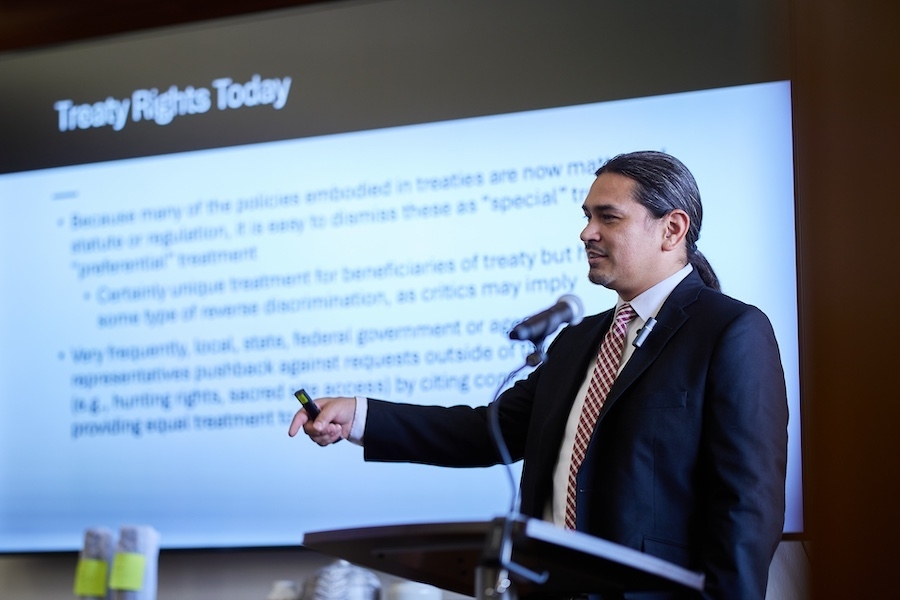
NORMAN, OKLA. — The University of Oklahoma recently hosted an event as part of its Ethical Tribal Engagement Series, which seeks to promote meaningful dialogue, cultivate ethical practices, and foster collaborative partnerships between Tribal Nations and representatives of non-Indigenous institutions. The event featured newly elected Comanche Nation Chairman Forrest Tahdooahnippah, JD (Comanche), who spoke on the topic of “Bridging Gaps: Treaties and Treaty Rights – A Tribal Leader’s Perspective.”
“Chairman Tahdooahnippah is deeply committed to Native law, focusing on protecting and strengthening Tribal sovereignty and educating others on these critical issues,” said Tana Fitzpatrick, JD, (Crow/Lakota/Ponca/Chickasaw), associate vice president of Tribal relations and director of the Native Nations Center. “We are grateful to him for illuminating OU faculty, staff and students about Comanche Nation’s treaties.”
Tahdooahnippah examined the trust relationships embedded in treaties between Tribal Nations and the U.S. government. His presentation included the historic and ongoing significance of treaty rights as more than legal contracts — they represent sacred agreements founded on trust and mutual respect, grounded in the sacrifices made by Native ancestors.
“For Indigenous peoples, treaties represent not just rights, but also responsibilities passed down from generations who fought, suffered and even gave their lives to secure them,” Tahdooahnippah said. “These are not just legal documents; they are human rights and fundamental rights that define the trust relationship between tribes and the federal government.”
During the keynote, Tahdooahnippah addressed a common misconception: that treaty rights are a form of special treatment or preferential status. He explained that this view undermines the true purpose of treaties, which are unique, nation-to-nation agreements.
“Calling treaty rights ‘special treatment’ has connotations of reverse discrimination, which misses the point entirely. Our treaty rights are our birthrights and they exist because our ancestors sacrificed for them,” he said.
Tahdooahnippah further explored the trust relationship through historical examples, including the Treaty of Medicine Lodge Creek, underscoring how treaties reflect the federal government’s recognition of Tribal Nations as sovereign entities.
“When the U.S. entered into treaties with the Comanche Nation, they were acknowledging us as nations — equivalent in status to any other sovereign country,” he said. However, he cautioned against interpreting treaties solely through the lens of Western contract law, which he argued fails to capture these agreements' moral and historical gravity.
Directly following his Keynote presentation, the Office of Tribal Relations hosted the inaugural “Ethical Engagement Showcase: Tribal Partnerships in Academia.” This event highlighted the work and collaborative efforts of faculty members from across OU’s Norman campus who are accomplished in fostering respectful relationships with Tribal Nations. Represented were 17 projects with 37 presenters from a diverse representation of OU departments, joined by partners from the Caddo Nation, Chickasaw Nation, Kiowa Tribe and the Otoe-Missouria Tribe.
The Comanche Nation is based near Lawton, Oklahoma.
To learn about the Native Nations Center in the Office of the President, visit ou.edu/nativenationscenter.
About the University of Oklahoma
Founded in 1890, the University of Oklahoma is a public research university located in Norman, Oklahoma. As the state’s flagship university, OU serves the educational, cultural, economic and health care needs of the state, region and nation. For more information about the university, visit www.ou.edu.
To combat power outages and extreme weather events, a team led by University of Oklahoma researchers has helped launch a project utilizing electric school buses as a backup energy resource.
The University of Oklahoma Health Campus was recently recognized for its increased momentum in advancing discoveries that change lives, achieving the state’s first Top 100 national ranking based on funding from the National Institutes of Health, according to the Blue Ridge Institute for Medical Research. The ranking—the highest in OU’s history and in the state—solidifies the University’s position as the state’s leading driver of health-related research.
Stefano Tarantini, an assistant professor in the Department of Neurosurgery at the University of Oklahoma College of Medicine, spends his days in the laboratory searching for answers to the cognitive decline that too often plagues older adults.